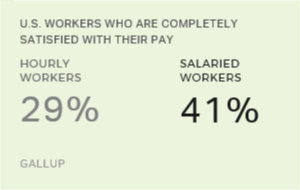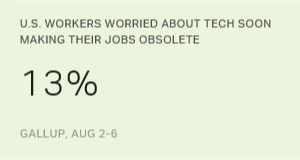Story Highlights
- 29% of hourly, 41% of salaried workers completely satisfied with pay
- Nearly three-quarters of each have good relationships with coworkers
- Largest differences seen on vacation time, retirement plans
WASHINGTON, D.C. -- Hourly workers in the U.S. are considerably less likely than salaried workers to say they are "completely satisfied" with their vacation time, retirement plans, overall earnings and health insurance benefits. Hourly workers are also less content with intangible measures such as job security, recognition for their accomplishments and opportunities for promotion.
| Salaried | Hourly | Difference | |||||||||||||||||||||||||||||||||||||||||||||||||||||||||||||||||||||||||||||||||||||||||||||||||
|---|---|---|---|---|---|---|---|---|---|---|---|---|---|---|---|---|---|---|---|---|---|---|---|---|---|---|---|---|---|---|---|---|---|---|---|---|---|---|---|---|---|---|---|---|---|---|---|---|---|---|---|---|---|---|---|---|---|---|---|---|---|---|---|---|---|---|---|---|---|---|---|---|---|---|---|---|---|---|---|---|---|---|---|---|---|---|---|---|---|---|---|---|---|---|---|---|---|---|---|
| % | % | pct. pts. | |||||||||||||||||||||||||||||||||||||||||||||||||||||||||||||||||||||||||||||||||||||||||||||||||
| The amount of vacation time you receive | 65 | 50 | +15* | ||||||||||||||||||||||||||||||||||||||||||||||||||||||||||||||||||||||||||||||||||||||||||||||||
| The retirement plan your employer offers | 48 | 34 | +14* | ||||||||||||||||||||||||||||||||||||||||||||||||||||||||||||||||||||||||||||||||||||||||||||||||
| The amount of money you earn | 41 | 29 | +12* | ||||||||||||||||||||||||||||||||||||||||||||||||||||||||||||||||||||||||||||||||||||||||||||||||
| The physical safety conditions of your workplace | 83 | 72 | +11* | ||||||||||||||||||||||||||||||||||||||||||||||||||||||||||||||||||||||||||||||||||||||||||||||||
| Your job security | 65 | 55 | +10* | ||||||||||||||||||||||||||||||||||||||||||||||||||||||||||||||||||||||||||||||||||||||||||||||||
| Your chances for promotion | 45 | 35 | +10* | ||||||||||||||||||||||||||||||||||||||||||||||||||||||||||||||||||||||||||||||||||||||||||||||||
| The health insurance benefits your employer offers | 45 | 35 | +10* | ||||||||||||||||||||||||||||||||||||||||||||||||||||||||||||||||||||||||||||||||||||||||||||||||
| The recognition you receive at work for your work accomplishments | 55 | 46 | +9* | ||||||||||||||||||||||||||||||||||||||||||||||||||||||||||||||||||||||||||||||||||||||||||||||||
| The flexibility of your hours | 64 | 62 | +2 | ||||||||||||||||||||||||||||||||||||||||||||||||||||||||||||||||||||||||||||||||||||||||||||||||
| Your relations with coworkers | 73 | 72 | +1 | ||||||||||||||||||||||||||||||||||||||||||||||||||||||||||||||||||||||||||||||||||||||||||||||||
| Your boss or immediate supervisor | 59 | 61 | -2 | ||||||||||||||||||||||||||||||||||||||||||||||||||||||||||||||||||||||||||||||||||||||||||||||||
| The amount of work that is required of you | 52 | 56 | -4 | ||||||||||||||||||||||||||||||||||||||||||||||||||||||||||||||||||||||||||||||||||||||||||||||||
| The amount of on-the-job stress in your job | 25 | 31 | -6 | ||||||||||||||||||||||||||||||||||||||||||||||||||||||||||||||||||||||||||||||||||||||||||||||||
| * Statistically significant | |||||||||||||||||||||||||||||||||||||||||||||||||||||||||||||||||||||||||||||||||||||||||||||||||||
| Gallup (2014, 2016 and 2017 combined data) | |||||||||||||||||||||||||||||||||||||||||||||||||||||||||||||||||||||||||||||||||||||||||||||||||||
These findings are from combined interviews conducted in 2014, 2016 and 2017 as part of Gallup's annual Work and Education poll.
Salaried workers are substantially more satisfied than hourly workers in eight of the 13 job aspects tested, with the biggest gaps seen on vacation time (65% vs. 50%, respectively), retirement benefits (48% vs. 34%) and pay (41% vs. 29%). Likewise, salaried workers are more satisfied than hourly workers with health insurance benefits (45% vs. 35%). This is not terribly surprising since salaried jobs are typically more likely than hourly jobs to offer higher pay and better benefits.
Meaningful differences also exist in workers' satisfaction with opportunities for promotion (45% satisfied among salaried vs. 35% satisfied among hourly) and recognition for accomplishments at work (55% vs. 46%).
While majorities of both salaried and hourly workers express complete satisfaction with the physical safety conditions of their workplace and their job security, the salaried group is more positive about both. Eighty-three percent of salaried workers are completely satisfied with the physical safety conditions of their workplace, compared with 72% of hourly workers. Job security follows this same pattern, with 65% of salaried workers and 55% of hourly workers expressing complete satisfaction.
Hourly workers are not significantly more satisfied than salaried workers on any of the workplace dimensions tested, but similar majorities of each say they are completely satisfied with coworker relationships, the flexibility of their hours and their immediate managers.
Composition of Salaried and Hourly Worker Groups
The two groups -- salaried and hourly -- not only differ attitudinally but also in their makeup. Compared with salaried workers, hourly workers are younger, less educated and live in households with lower annual incomes.
| All U.S. workers | Salaried | Hourly | ||||||||||||||||||||||||||||||||||||||||||||||||||||||||||||||||||||||||||||||||||||||||||||||||||
|---|---|---|---|---|---|---|---|---|---|---|---|---|---|---|---|---|---|---|---|---|---|---|---|---|---|---|---|---|---|---|---|---|---|---|---|---|---|---|---|---|---|---|---|---|---|---|---|---|---|---|---|---|---|---|---|---|---|---|---|---|---|---|---|---|---|---|---|---|---|---|---|---|---|---|---|---|---|---|---|---|---|---|---|---|---|---|---|---|---|---|---|---|---|---|---|---|---|---|---|---|
| % | % | % | ||||||||||||||||||||||||||||||||||||||||||||||||||||||||||||||||||||||||||||||||||||||||||||||||||
| Age | ||||||||||||||||||||||||||||||||||||||||||||||||||||||||||||||||||||||||||||||||||||||||||||||||||||
| 18-29 | 20 | 15 | 26 | |||||||||||||||||||||||||||||||||||||||||||||||||||||||||||||||||||||||||||||||||||||||||||||||||
| 30-49 | 47 | 48 | 46 | |||||||||||||||||||||||||||||||||||||||||||||||||||||||||||||||||||||||||||||||||||||||||||||||||
| 50-64 | 28 | 34 | 23 | |||||||||||||||||||||||||||||||||||||||||||||||||||||||||||||||||||||||||||||||||||||||||||||||||
| 65+ | 5 | 4 | 4 | |||||||||||||||||||||||||||||||||||||||||||||||||||||||||||||||||||||||||||||||||||||||||||||||||
| Education | ||||||||||||||||||||||||||||||||||||||||||||||||||||||||||||||||||||||||||||||||||||||||||||||||||||
| College graduate | 40 | 62 | 21 | |||||||||||||||||||||||||||||||||||||||||||||||||||||||||||||||||||||||||||||||||||||||||||||||||
| Not college graduate | 59 | 37 | 79 | |||||||||||||||||||||||||||||||||||||||||||||||||||||||||||||||||||||||||||||||||||||||||||||||||
| Annual household income | ||||||||||||||||||||||||||||||||||||||||||||||||||||||||||||||||||||||||||||||||||||||||||||||||||||
| <$30,000 | 13 | 5 | 19 | |||||||||||||||||||||||||||||||||||||||||||||||||||||||||||||||||||||||||||||||||||||||||||||||||
| $30,000-<$75,000 | 40 | 30 | 51 | |||||||||||||||||||||||||||||||||||||||||||||||||||||||||||||||||||||||||||||||||||||||||||||||||
| $75,000+ | 47 | 65 | 30 | |||||||||||||||||||||||||||||||||||||||||||||||||||||||||||||||||||||||||||||||||||||||||||||||||
| Type of worker | ||||||||||||||||||||||||||||||||||||||||||||||||||||||||||||||||||||||||||||||||||||||||||||||||||||
| White collar | 74 | 86 | 66 | |||||||||||||||||||||||||||||||||||||||||||||||||||||||||||||||||||||||||||||||||||||||||||||||||
| Blue collar | 23 | 12 | 31 | |||||||||||||||||||||||||||||||||||||||||||||||||||||||||||||||||||||||||||||||||||||||||||||||||
| Race | ||||||||||||||||||||||||||||||||||||||||||||||||||||||||||||||||||||||||||||||||||||||||||||||||||||
| Non-Hispanic white | 68 | 74 | 64 | |||||||||||||||||||||||||||||||||||||||||||||||||||||||||||||||||||||||||||||||||||||||||||||||||
| Nonwhite | 30 | 25 | 34 | |||||||||||||||||||||||||||||||||||||||||||||||||||||||||||||||||||||||||||||||||||||||||||||||||
| Gallup (2014, 2016 and 2017 combined data) | ||||||||||||||||||||||||||||||||||||||||||||||||||||||||||||||||||||||||||||||||||||||||||||||||||||
Adults younger than 30 make up 26% of hourly workers, compared with 15% of salaried workers.
Sixty-two percent of salaried workers graduated from college, while 79% of hourly workers did not. And while seven in 10 hourly workers have household incomes of less than $75,000, 65% of salaried workers are in households earning $75,000 or more.
More muted -- though still sizable -- differences are seen when comparing the two groups by race and by the type of work they perform. Overall, hourly workers are more likely to describe their work as "blue collar" than salaried employees are, and nonwhite workers are more likely to hold hourly jobs than salaried.
Implications
For all of the differences between salaried and hourly workers, roughly equal majorities of both are satisfied with their coworkers and their immediate managers.
Still, these two groups of workers present unique challenges for those who manage them. Hourly workers are significantly less satisfied with most aspects of their job, and as a result may be more difficult to manage. With the gig economy on the rise, hourly workers' lower satisfaction with various job aspects will likely only worsen.
Gallup's Employee Engagement Index tracks the percentage of U.S. employees who are engaged at work -- what Gallup defines as "those who are involved in, enthusiastic about and committed to their work and workplace." The current reading of 34% nationally makes it clear that managers of both salaried and hourly workers have their work cut out for them in this area. But managers of hourly workers may have a steeper hill to climb, as these workers are generally less satisfied with fundamental job aspects such as pay and benefits.
While managers may not be able to increase wages or improve benefits for their workers, they can try to improve the less tangible aspects of employment. For both hourly and salaried workers, Gallup polling suggests that managers would do well to start with workplace elements they can improve for all workers, such as offering recognition, providing flexible hours, and helping to manage employees' workload and stress. In the case of hourly workers, there's considerable room for improvement when it comes to recognizing their accomplishments on the job.

Create Exceptional Workers
Strengthen employee performance with a culture of engagement.
Survey Methods
Results for this Gallup poll are based on combined telephone interviews from Gallup's 2014, 2016 and 2017 Work and Education surveys, conducted each August with random samples of employed adults, aged 18 and older, living in all 50 U.S. states and the District of Columbia.
For results based on the total sample of 1,509 employed adults, the margin of sampling error is ±3 percentage points at the 95% confidence level. For results based on the total sample of 705 salaried employees, the margin of sampling error is ±5 percentage points at the 95% confidence level. For results based on the total sample of 619 hourly employees, the margin of sampling error is ±5 percentage points at the 95% confidence level. All reported margins of sampling error include computed design effects for weighting.
View survey methodology, complete question responses and trends.
Learn more about how the Gallup Poll Social Series works.





